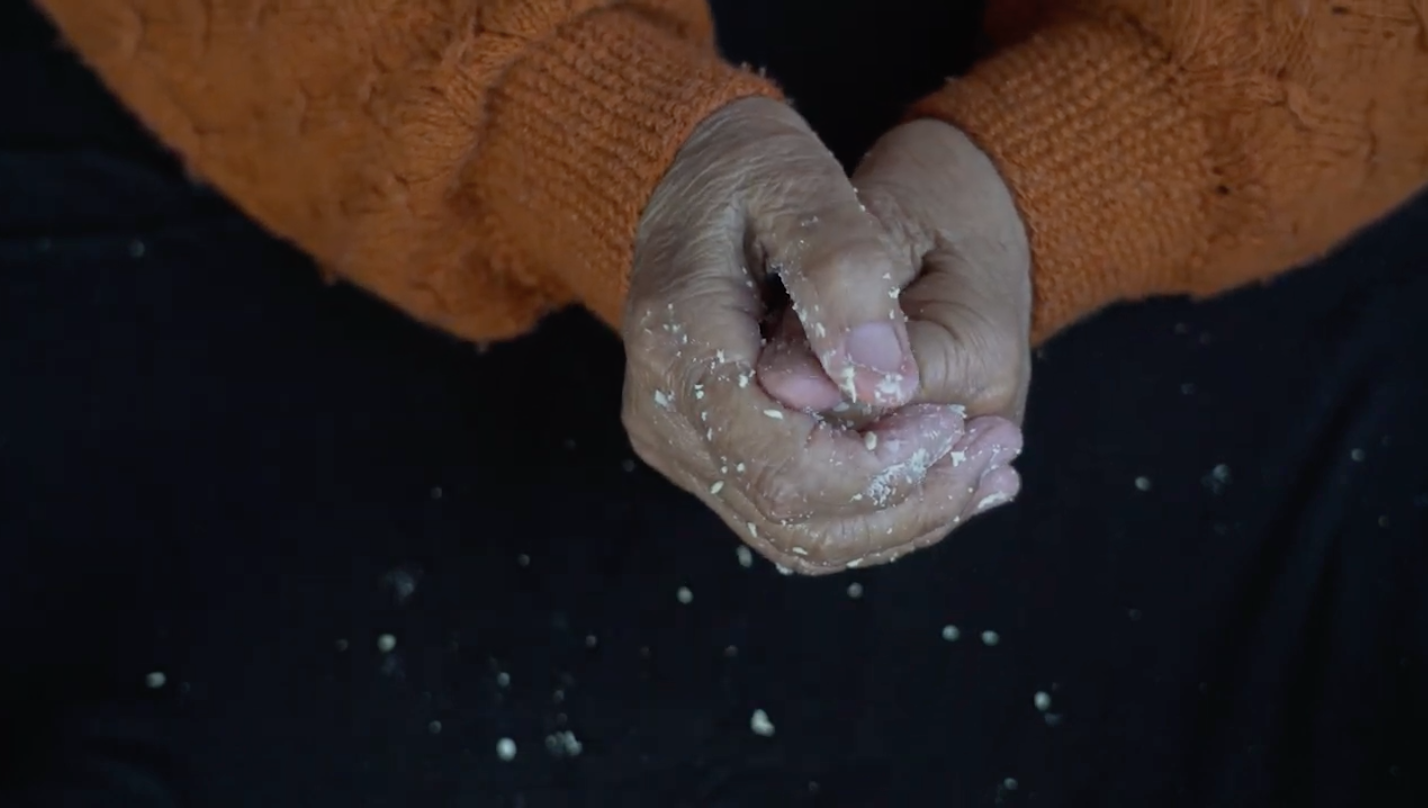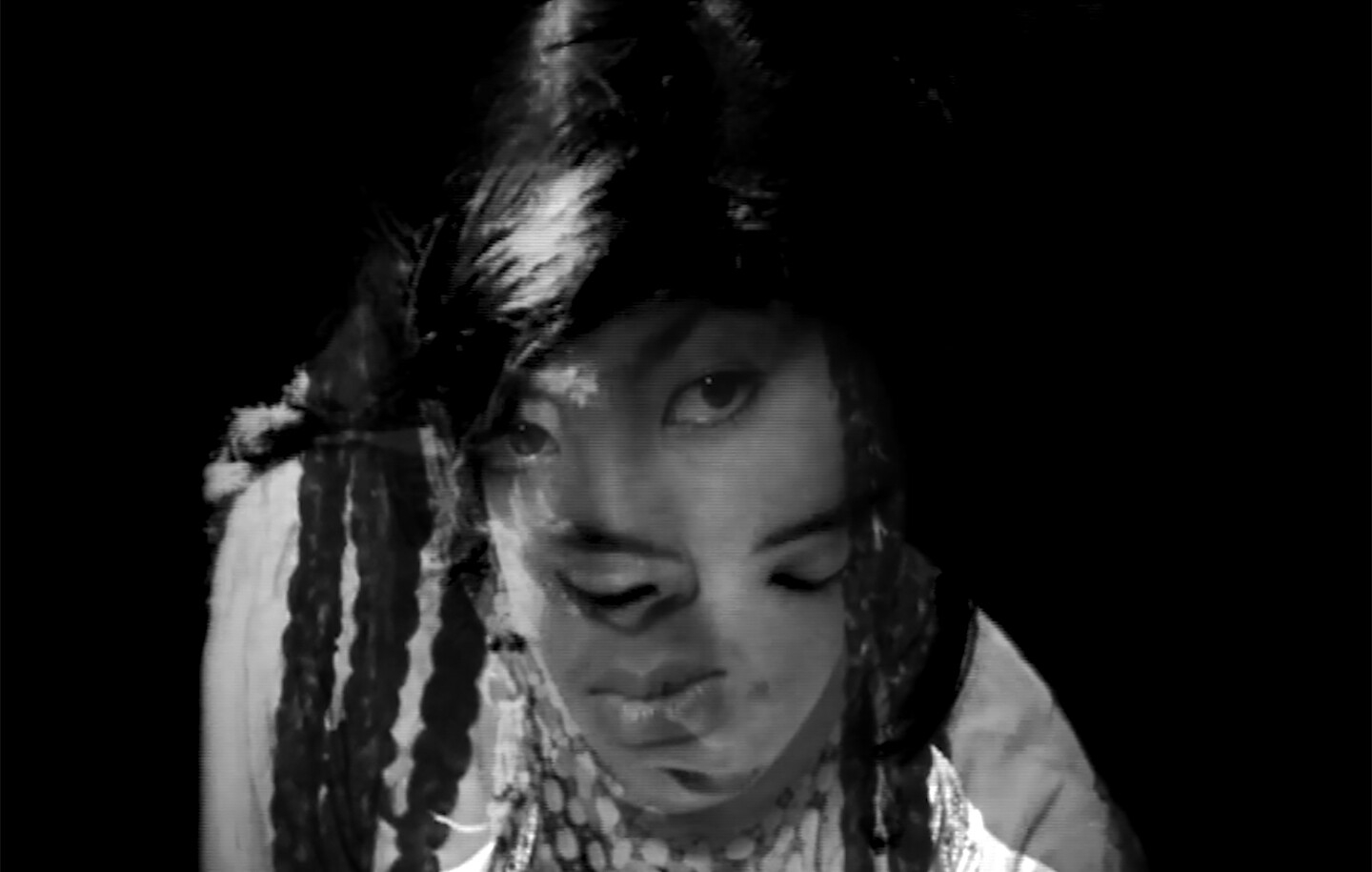Her Gaze: Moving Image from Central Asia
Aïda Adilbek, Medina Bazarğali, Saodat Ismailova, Madina Joldybek, Nazira Karimi, Daria Kim, Zumrad Mirzalieva
Film screening
24 May – 30 September 2024
Vleeshal (Map)
Curators: Dilda Ramazan, DAVRA Collective, League of Tenders

Her Gaze: Moving Image from Central Asia is part of the International Nomadic Program 2024-2025 Repetition is a Form of Changing organized by League of Tenders. This is the first event of the First Season of this program, Her Right, devoted to decolonial approaches to feminism and questioning it from non-Western perspectives. In Her Right League of Tenders revisits the immersive exhibition International Feminist Art that was on display in Vleeshal in 1980 and which, despite proclaiming to present artists who ‘emerged in many places around the world’, focused on the western art scene.
For the first event, League of Tenders invited curator Dilda Ramazan and DAVRA Collective to curate a screening program with films by Central Asian women artists.
The program Her Gaze: Moving Image from Central Asia brings together works made by Central Asian women artists of different generations. The videos are realized roughly within the last four years and include a variety of subjects all focusing on female experiences emanating from this particular region of the world. These are women showing women, women making women seen, either when they are involved in the domestic day-to-day life (Aïda Adilbek, Madina Joldybek, Nazira Karimi); or when they are being deprived of agency and instrumentalized by the top-down political agendas (Saodat Ismailova, Zumrad Mirzalieva, Medina Bazargali); or when they simply go through odds of this life reflecting on it from their own bodily and mental perspectives (Daria Kim).
The use of archival materials and found footage in the works of Saodat Ismailova and Nazira Karimi allows these artists to formulate alternative narratives, challenging the historically dominating Western-centric patriarchal ones. Aïda Adilbek addresses a women’s household viewpoint focusing on qurt, or a Kazakh traditional dry fermented product, which preparation in the film becomes a recipe of kinship used to activate female family lineage. Women’s reproductive rights and a broader lack of visibility around the issue of maternity (both chosen and imposed) are central in the videos by Madina Joldybek and Zumrad Mirzalieva. The Uzbekistani Daria Kim unveils some personal struggles through her own sensory perspective which constitutes the key frame of her abstract piece. Concluding the program, Medina Bazargali’s film highlights the Kazakh traditional oral art form known as aitys. The artist reappropriates it in an attempt to decolonize this improvisation-based practice, restoring its subversive political potential.
Altogether, the selection aims to shed light on the rich and multifaceted Central Asian film production presenting female authors in accordance with the role that they perform today: the key actors of the region’s dynamic artistic scene.
The screenings were held in various locations and co-organized by local feminist and art collectives:
May 24 – Vleeshal Center for Contemporary Art, Middelburg, Netherlands
June 18 – moc hub, Tashkent, Uzbekistan. Co-organized by Maqaal Collective and accompanied by a specially curated series of films by Uzbek artists Violetta Bogdanova, Lolisanum Ulugova, Gulnoza Irgasheva, Intizor Otaniyozova, and Aigaym Mukhamejan.
June 26 – _bUlt, Almaty, Kazakhstan. The screening was followed by a discussion with artist Aida Adylbek and co-curator of the program, Dilda Ramazan.
July 16 – Mirzoyan Library, Yerevan, Armenia. Co-organized by Typography Collective and followed by a discussion featuring film curator Sona Karapoghosyan, film director and artist Ananhit Ghazaryan, and women's rights defender Zemfira Gogui.
July – East East magazine. Special online screening of Medina Bazarğali’s film Aitys.
August 1 – Monee Gallery, Dushanbe, Tajikistan. Co-organized with Monee Gallery and Ruyò Journal.
August–September – Ruyò Journal. Special online screening.
September 25 – Amondo Cinema, Warsaw, Poland. Co-organized by director and researcher Anushe Dustova.
October 29 – College of Liberal Arts and Sciences, University of Warsaw, Poland. Special screening and discussion as part of the annual conference Reshaping Dependencies and Sovereignties: Decoloniality in Central Asia and Beyond.
Dilda Ramazan is a Kazakhstan-born art worker specializing in Central Asian contemporary art. She curates exhibitions and publications, writes on art and is currently pursuing her PhD at Sorbonne Université. In 2020, together with her colleagues, she co-founded MATA, an all-female art collective based in Kazakhstan. Ramazan is also part of Beyond the post-soviet, a collective that produces and disseminates knowledge on regions previously referred to as ‘post-socialist’ countries.
DAVRA is a Central Asian research group initiated in 2021 by Saodat Ismailova. Its mission is to connect and develop the Central Asian art scene by fostering the dynamic exchange of experiences within the region as a priority.
Developed as part of
Persons
Aïda Adilbek
Medina Bazarğali
Saodat Ismailova
Madina Joldybek
Nazira Karimi
Daria Kim
Zumrad Mirzalieva
Dilda Ramazan
DAVRA Collective
League of Tenders
Series
Repetition is a Form of Changing is a program developed by the new curators for Vleeshal’s Nomadic Program 2024-2025: Maria Sarycheva and Elena Ishchenko who form the curatorial duo League of Tenders.
League of Tenders envisions Repetition is a Form of Changing as a collective attempt at rehearsing and practicing non-imperial and anti-colonial ideals. The program consists of Four Seasons. For each Season, League of Tenders will invite non-Western artists, musicians, filmmakers, and choreographers to approach and repeat one of Vleeshal’s previous projects and question the (western) knowledge behind feminism, language, ecology, and care. They will revisit these concepts and discuss them from their own perspectives. By placing these concepts in underrepresented international art contexts, League of Tenders proposes new perspectives and enacts the necessary process of changing. This collective rehearsal will be approached from the perspectives of Indigenous people reconnecting with their cultures, colonized people resisting colonial oppression, and displaced individuals searching for a home beyond their homeland. Repetition is a Form of Changing will extend beyond state borders, encompassing localities such as Idel-Ural, North and South Caucasus, and Central and Northern Asia. Various independent initiatives and collectives based in these locations will join League of Tenders during the events of Vleeshal’s Nomadic Program 2024-2025 in order to spark and support translocal networks of solidarity.
League of Tenders is an imaginary organization and curatorial duo established in 2018 by curators, researchers, and friends Elena Ishchenko and Maria Sarycheva aimed at cultivating collectivities and fostering the affective dynamics within them. Over time, League of Tenders has focused on disability representation, overcoming the alienation of everyday labor, practices of care, support, and friendship in the age of disasters. Their projects disrupt traditional forms, seeking to place concepts, people, and artworks in unexpected contexts and inviting them to engage in dialogue. The duo has been appointed as Vleeshal's nomadic curators for Vleeshal's Nomadic Program 2024-2025.
Elena Ishchenko is a curator, researcher and, activist. In her practice, Elena Ishchenko is nurturing a decolonial approach to curating and knowledge production, while addressing power relations inherited from colonial policies, particularly within the russian* context. She has worked as a curator at the Typography Center for Contemporary Art (Krasnodar, russia), a researcher at the Garage Museum (Moscow, russia), and has developed exhibitions, educational initiatives, workshops, and other projects in russia, Germany, Armenia, Switzerland, among others. Her recent projects include Өмә (nGbK, Kunstraum Kreuzberg/Bethanien, Berlin, 2023), an exhibition that represented the complexity of russia as a colonial realm through stories of artists of Indigenous, migrant, and racialized backgrounds, and Translocal Dialogues (online, 2022), which sought to weave solidarity networks by inviting cultural workers from various contexts to share their experiences, thoughts and feelings on wars, decolonial possibilities, forced migration, and state violence.
Elena is based in Cologne, Germany.
Maria Sarycheva was born in Ufa, Bashqortostan. From 2012 until 2023, she worked independently as a curator and educator in various regions of russia. In 2015, she initiated the Department of Inclusive Programs at the Garage Museum of Contemporary Art. In 2019, she established the Department of Access and Inclusion at the State Tretyakov Gallery and served as its Head until March 2023. Besides dealing with architectural barriers, she was also responsible for the accessibility of museum content and collection for blind people and people with low vision; D/deaf and hard of hearing community; and for visitors with diverse developmental and learning disabilities.
Currently, Maria lives as a nomad, wandering somewhere between Berlin and Bashqortostan. Her research interests include care, feminist theory and practice, and disability history.
*League of Tenders uses “russia” and “russian” in lowercase to condemn the war against Ukraine unleashed by russia and its policy in general, and to express solidarity with Ukrainians and the participants of decolonial movements.
